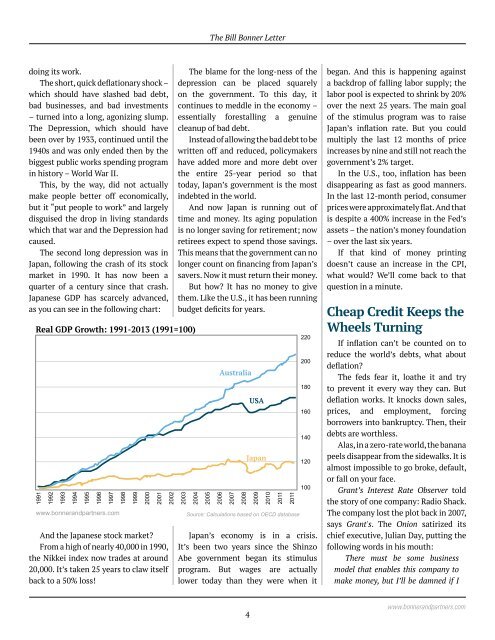Create successful ePaper yourself
Turn your PDF publications into a flip-book with our unique Google optimized e-Paper software.
The Bill Bonner Letter<br />
doing its work.<br />
The short, quick deflationary shock –<br />
which should have slashed bad debt,<br />
bad businesses, and bad investments<br />
– turned into a long, agonizing slump.<br />
The Depression, which should have<br />
been over by 1933, continued until the<br />
1940s and was only ended then by the<br />
biggest public works spending program<br />
in history – World War II.<br />
This, by the way, did not actually<br />
make people better off economically,<br />
but it “put people to work” and largely<br />
disguised the drop in living standards<br />
which that war and the Depression had<br />
caused.<br />
The second long depression was in<br />
Japan, following the crash of its stock<br />
market in 1990. It has now been a<br />
quarter of a century since that crash.<br />
Japanese GDP has scarcely advanced,<br />
as you can see in the following chart:<br />
Real GDP Growth: 1991-2013 (1991=100)<br />
1991<br />
1992<br />
1993<br />
1994<br />
1995<br />
1996<br />
1997<br />
www.bonnerandpartners.com<br />
1998<br />
1999<br />
2000<br />
2001<br />
And the Japanese stock market?<br />
From a high of nearly 40,000 in 1990,<br />
the Nikkei index now trades at around<br />
20,000. It’s taken 25 years to claw itself<br />
back to a 50% loss!<br />
2002<br />
The blame for the long-ness of the<br />
depression can be placed squarely<br />
on the government. To this day, it<br />
continues to meddle in the economy –<br />
essentially forestalling a genuine<br />
cleanup of bad debt.<br />
Instead of allowing the bad debt to be<br />
written off and reduced, policymakers<br />
have added more and more debt over<br />
the entire 25-year period so that<br />
today, Japan’s government is the most<br />
indebted in the world.<br />
And now Japan is running out of<br />
time and money. Its aging population<br />
is no longer saving for retirement; now<br />
retirees expect to spend those savings.<br />
This means that the government can no<br />
longer count on financing from Japan’s<br />
savers. Now it must return their money.<br />
But how? It has no money to give<br />
them. Like the U.S., it has been running<br />
budget deficits for years.<br />
2003<br />
2004<br />
2005<br />
2006<br />
Australia<br />
2007<br />
2008<br />
USA<br />
Japan<br />
2009<br />
2010<br />
2011<br />
2011<br />
Source: Calculations based on OECD database<br />
220<br />
200<br />
180<br />
160<br />
140<br />
120<br />
100<br />
Japan’s economy is in a crisis.<br />
It’s been two years since the Shinzo<br />
Abe government began its stimulus<br />
program. But wages are actually<br />
lower today than they were when it<br />
began. And this is happening against<br />
a backdrop of falling labor supply; the<br />
labor pool is expected to shrink by 20%<br />
over the next 25 years. The main goal<br />
of the stimulus program was to raise<br />
Japan’s inflation rate. But you could<br />
multiply the last 12 months of price<br />
increases by nine and still not reach the<br />
government’s 2% target.<br />
In the U.S., too, inflation has been<br />
disappearing as fast as good manners.<br />
In the last 12-month period, consumer<br />
prices were approximately flat. And that<br />
is despite a 400% increase in the Fed’s<br />
assets – the nation’s money foundation<br />
– over the last six years.<br />
If that kind of money printing<br />
doesn’t cause an increase in the CPI,<br />
what would? We’ll come back to that<br />
question in a minute.<br />
Cheap Credit Keeps the<br />
Wheels Turning<br />
If inflation can’t be counted on to<br />
reduce the world’s debts, what about<br />
deflation?<br />
The feds fear it, loathe it and try<br />
to prevent it every way they can. But<br />
deflation works. It knocks down sales,<br />
prices, and employment, forcing<br />
borrowers into bankruptcy. Then, their<br />
debts are worthless.<br />
Alas, in a zero-rate world, the banana<br />
peels disappear from the sidewalks. It is<br />
almost impossible to go broke, default,<br />
or fall on your face.<br />
Grant’s Interest Rate Observer told<br />
the story of one company: Radio Shack.<br />
The company lost the plot back in 2007,<br />
says Grant's. The Onion satirized its<br />
chief executive, Julian Day, putting the<br />
following words in his mouth:<br />
There must be some business<br />
model that enables this company to<br />
make money, but I’ll be damned if I<br />
4<br />
www.bonnerandpartners.com


